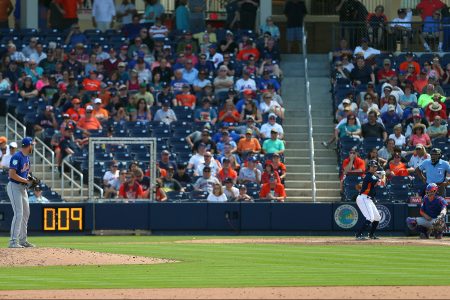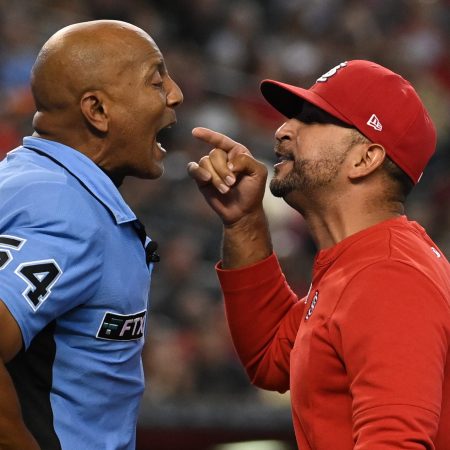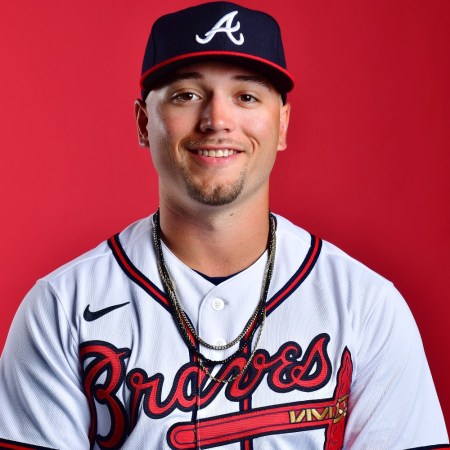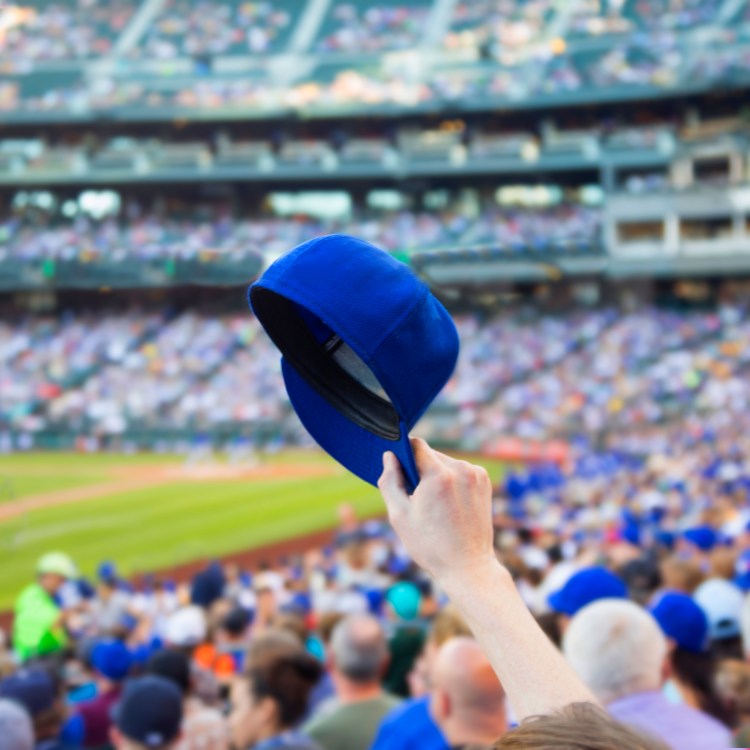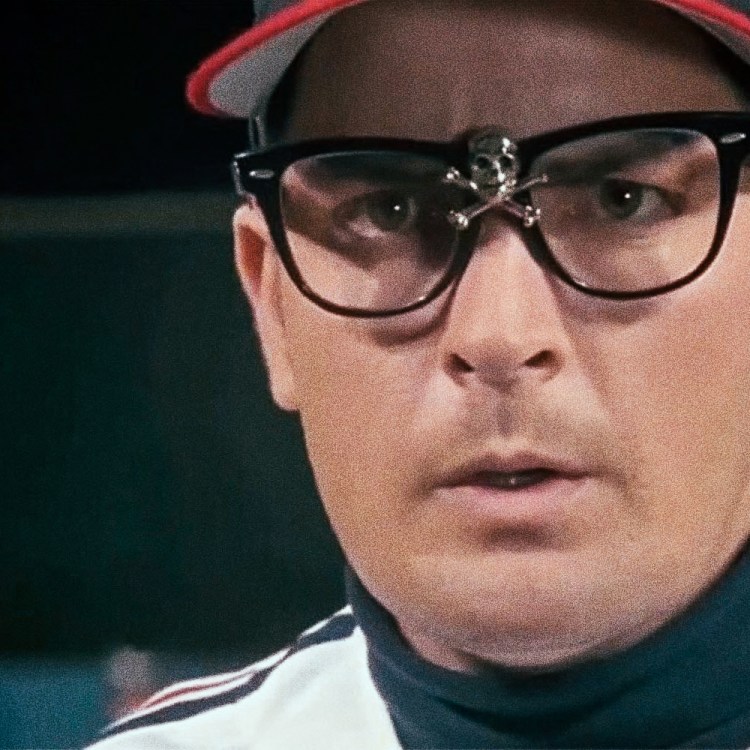Earlier this week, members of MLB’s competition committee gathered together to discuss proposed “tweaks” to the league’s new rules, per The Athletic. The Player’s Association, which voted against the pitch clock and the infield-shift ban when the committee met last summer, supplied suggestions to the league.
But with a majority of appointees to the competition committee, which was created last year, the commissioner’s office was always going to decide whether or not changes to the new rules would be made. However, the committee’s meeting at the very least “[opened] the door to potential rule modifications for Opening Day,” wrote The Athletic on Monday. “It wasn’t immediately known what specific changes were discussed, but if any are made, they’re not expected to be major.”
Major League Baseball Finally Decides It’s Time for a Pitch Clock and Shift Ban
Larger bases for the 2023 MLB season could be approved in a vote that could happen as soon as todayToday, Jeff Passan of ESPN reported that, in fact, MLB has told ball clubs in a memo that it will make some alterations to the new rules. But don’t get too excited about them. They’re not the rule changes you’re looking for.
“MLB…will continue with the parameters of the pitch clock that players have been using all spring,” Passan wrote. “15 seconds with the bases empty and 20 seconds with runners on base, plus the hitter needing to be ‘alert’ in the batter’s box with 8 seconds remaining.”
Still, MLB Commissioner Rob Manfred said on Tuesday that his office will remain open to pitch clock changes as the year goes on. First, he wants “to see how it plays out exactly over a period of adjustment in some regular-season games.”
If the number of ticks the pitch clock takes between pitches expands, that would be music to the ears of at least a few Major League ballplayers. New York Mets relief pitcher David Robertson recently told the New York Post he’d like to see the league “get rid of it.”
“It’s way too fast, especially when you’re just trying to have a conversation with your catcher and you don’t have any time,” he said. “That doesn’t make a lot of sense to me.”
Robertson doesn’t even like that he only has two minutes and five seconds between innings to warm up, which was a new rule implemented in 2015. He voiced displeasure about that piece of legislation in 2016, and when asked about the possibility of a pitch clock back then, he said just the thought of it “annoys the crap out of me.”
“You can’t take a game I’ve been playing for a long time and change it by putting a shot clock in. It’s pretty ridiculous. It’s not basketball,” he told NBC Sports. “We’re asked to do things in this game and it’s hard enough to do without a clock weighing on top of you. Obviously I get where they’re at and they have television contracts and timing is a big issue, they want the pace of the game to be shorter. But that just doesn’t seem like something that is going to work.”
For whatever it’s worth, Robertson’s teammate, starting pitcher Max Scherzer, has taken to the pitch clock perhaps more than anyone else — and you’ll recall he didn’t exactly love being checked for sticky stuff the first few times in 2021. On the pitch clock, Scherzer said it allows the pitchers to “totally dictate pace,” an advantage that he has leveraged and will undoubtedly continue to exploit.
But Pittsburgh Pirates right-hander Vince Velasquez was also critical of the pitch clock. So was Philadelphia Phillies starter Zack Wheeler, who said it “messes up the game too much,” but conceded that if the pitch clock was not as quick he might have less of an issue with it. Another New York newspaper, amNY, quoted up-and-coming batting prospects who don’t like the clock, and San Francisco Giants manager Gabe Kapler told NBC Sports, “you hate it as a hitter to feel like the pitcher is right on top of you and you couldn’t catch your breath and think through things and before you knew it the at-bat was over.”
If the competition committee met over the pitch clock, it’s fair to say more dissenting voices on this topic were probably heard. However, the pitch clock is doing what it was intended to do: shorten MLB games.
After two weeks of the pitch clock in spring training, The Athletic’s Jayson Stark reported that those games were 25 minutes shorter on average than the ones contested last spring. Compared to 2022’s regular-season game-length average, the matchups were a full half-hour shorter, 2:36 vs. 3:06. Doubling down on his enthusiasm for the change, Stark noted that all that time lost was pure “dead time” that won’t be missed.
As for the infield-shift ban, which has seemingly drawn less ire from players and coaches, it’s also “working.” According to an Associated Press article, after 10 days of spring training games, batting averages were up to .263 from a rate of .259 last season. That’s not much of a change, which would fall in line with a Baseball America report from last fall that said the shift ban wouldn’t have any significant impact on batted ball outcomes. However, the rule change was meant to benefit left-handed hitters the most, as they’ve been subjected to the defensive strategy more often than righties. Citing Elias Sports Bureau data, the AP said left-handed hitter batting average jumped up to .274 during the first week and a half of spring games from .255 last year.
There’s also been the planting of larger bases, designed to boost the stolen-base rate — doing so successfully so far — and reduce injury risks. The bigger bases have at least one fan in Los Angeles Dodgers outfielder David Peralta, who said they’re easier to navigate while running.
MLB has actually always been open to conversation with the players about changes. MLB spokesperson Glen Caplin told The Athletic last month: “If it’s a small tweak that needs to be made, that can be done. I don’t think you’re going to see a large wholesale change of any kind.” MLB’s chief operations and strategy officer Chris Marinak also noted at the time that the league has a history of offering teams enhanced “interpretations” of rules and extra “guidance” on how to play within them during the course of a regular season. “And that may be something that we need to do this go around, depending on what circumstances unfold,” he said. “Outside of that, I’m not sure that we have any plans to do anything more.”
But changes have been deliberated over this week and, now, made official.
“The most important piece of the memo distributed Wednesday was the league changing replay review rules on potential violations of the infield shift ban,” Passan wrote. “With the possibility of teams regularly issuing challenges after outs in hopes that one of the four infielders was positioned with his feet on the outfield grass — which would negate the out and return the batter to the plate — the memo said on batted balls that only the positioning of the defender fielding them could be challenged.”
The memo also addressed some pitch clock-related concerns, including when it can be reset and delayed from starting. For example, if a PitchCom device, which is used by catchers and pitchers to call pitches, malfunctions, they must immediately notify the umpiring crew, who will stop the pitch clock.
“On brushback pitches and ‘big swings’ — which either knock equipment out of place or land a player splayed out on the ground — umpires will delay the start of the clock and, if the clock operator starts it early, have the ability to wave off the timer,” wrote Passan.
In situations where a pitcher is taken far away from the mound, like if they have to cover first base on a ground ball to the left-hand side of the diamond, the umpire will delay the between-batter clock of 30 seconds. Catchers may also get a little more time to put their equipment back on between innings, as long as they put forth a “reasonable effort,” the memo said.
There were also new guidelines connected to hitter timeouts and batboy and batgirl equipment-retrieval performance. “The league will evaluate the performances of batboys and batgirls and could ask teams to replace them if it’s considered substandard” in terms of time spent, Passan wrote.
So it doesn’t appear David Robertson will get his wish to see the pitch clock dissolved. But the fans, who MLB says want to see shorter games with more action, are about to get theirs.
Opening Day, which marks the time in which the games begin to count, is just a little more than a week away.
Thanks for reading InsideHook. Sign up for our daily newsletter and be in the know.

